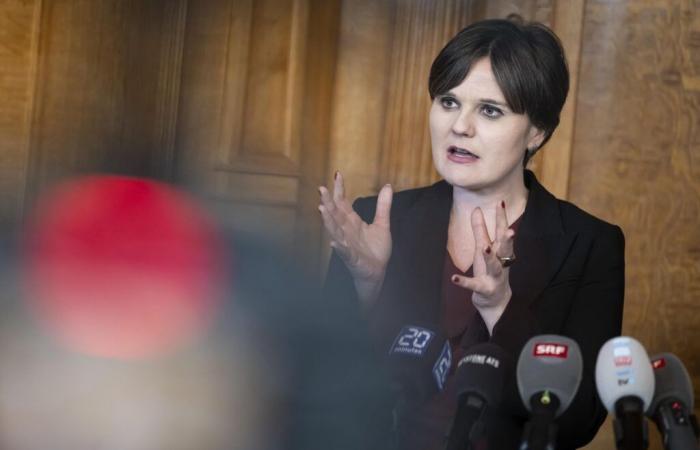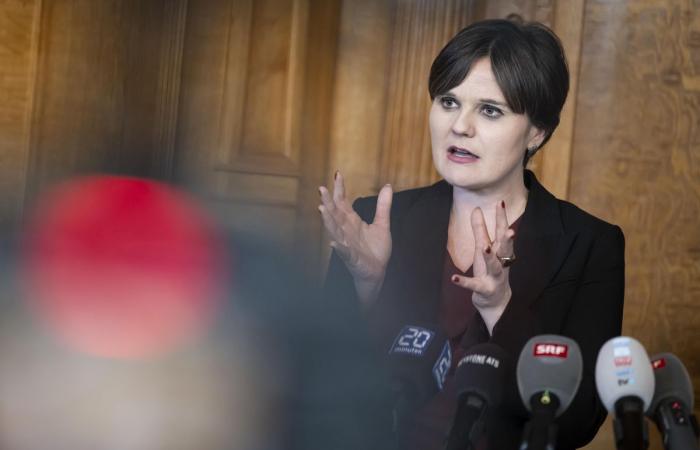Federal budget –
Switzerland plans more money for the army and less for the poor
The Finance Committee of the National Council wants to reduce funds intended for international cooperation. Former heavyweights from the bourgeois camp warn.
Published today at 5:02 p.m.
The Swiss army needs 530 million more in 2025, summarized the president of the Finance Commission, Sarah Wyss, during a press briefing.
ANTHONY ANEX/KEYSTONE
Subscribe now and enjoy the audio playback feature.
BotTalk
- The Finance Commission of the National Council wants to increase spending on the army.
- Agriculture must also receive more money.
- Development aid must be reduced by 250 million francs.
- Former parliamentarians warn of negative consequences for Switzerland’s reputation.
The fiscal policy showdown will take place in December. Parliament will decide on the federal budget for next year. The Finance Commission of the National Council presented its proposals. Commission President Sarah Wyss (PS) told the media that priorities had to be set. For the majority, national defense and agriculture should be placed at the forefront.
The Finance Commission wants to spend 530 million francs more than the Federal Council on defense next year. It also maintains its goal of increasing military spending to 1% of gross domestic product by 2030 instead of 2035. To do this, an additional $4 billion will be needed over the next four years.
The Commission, however, spread part of the additional expenditure of 660 million francs initially planned for 2025 over the following years, because otherwise it would not have been able to comply with the debt brake rules. She would have adapted the growth curve, underlined Sarah Wyss on this subject. Higher revenues for the army, for example an increase in VAT, are not on the agenda in the short term. This would require a popular vote.
The committee also wants to increase spending on agriculture by 46 million francs. The majority is intended for direct payments. According to the Basel national councilor, supporters argued that, unlike others, this spending had not increased in recent years.
Ignazio Cassis resists in vain
Above all, the commission wants to make savings in development aid. She wants to reduce it by 250 million francs. In addition, she wants to reduce expenses for federal personnel by 70 million and those for external services by 35 million. The consequences for federal employees are not yet known. Implementation is the responsibility of the Federal Council. Other reductions concern the area of asylum. Cuts of more than 100 million francs are planned in this area. However, due to the drop in the number of asylum seekers, the Confederation recently decided to close temporary asylum centers. For Sarah Wyss, this would already save a lot of money.
When it comes to spending on international cooperation, parliament is sending contradictory signals. When the measures and funds allocated for the next four years were discussed in the autumn, the Council of States decided against a reduction. The National Council has not yet made a decision. The commission is, however, in favor of a reduction of one billion, or 250 million francs per year.
The Federal Council is asking parliament for credits totaling 11.3 billion francs for the next four years. This is certainly approximately the same amount as for the current period. But 1.5 billion is now planned for Ukraine. The countries of the South therefore already have less money than before, say opponents of budget cuts.
The Minister of Foreign Affairs, Ignazio Cassis (PLR), is also resisting. According to committee members, he said cuts of 250 million francs per year were not compatible with the current strategy. All development aid should be reorganized. But the representatives of the bourgeois parties, including the Center, did not allow themselves to be swayed. PLR parliamentarians also opposed the federal councilor.
Call of former heavyweights
On the other hand, former bourgeois parliamentarians take up the cause of development aid. “We are very worried,” they wrote in a letter addressed to their colleagues in office. The letter, of which we obtained a copy, bears the signatures of former influential political figures from the Center such as Urs Schwaller, Peter Bieri, Eugen David and Rosmarie Quadranti. Former PLR national advisors Felix Gutzwiller and Claude Ruey also signed. To the list are added representatives from economic, scientific and religious circles.
Reductions of this magnitude would result in the end of successful projects and the closure of foreign representations in Switzerland, they fear. This would mean “more people could suffer from treatable illnesses, fewer children would go to school and fewer young people would be able to get training”.
These plans would jeopardize Switzerland’s reputation and its special position in diplomacy. The rich little country would no longer fulfill its international obligations. In a world torn by crises, cuts in humanitarian aid would have the effect of depriving people in great distress of the means of survival. “This would result in more instability, exile and migratory movements, including towards Switzerland.”
“Latest news”
Want to stay on top of the news? “24 Heures” offers you two appointments per day, directly in your email box. So you don’t miss anything that’s happening in your Canton, in Switzerland or around the world.
Other newsletters
Log in
Charlotte Walser has been part of the Federal Palace team of the Tamedia editorial team since 2021. A doctor of philosophy, she has worked as a journalist since 1995. From 2010 to 2020 she was a Federal Palace correspondent for the Keystone-SDA news agency. She has also worked for InfoSud and the UN refugee agency UNHCR.More info
Did you find an error? Please report it to us.
41 comments







